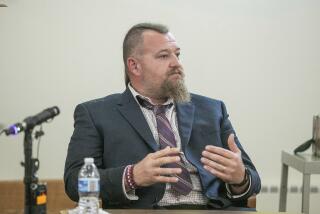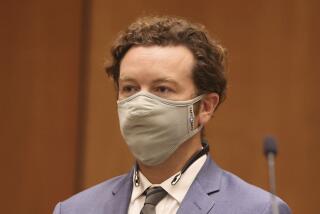Jury in terrorism trial is deadlocked
- Share via
MIAMI — A federal jury reported Thursday that it was deadlocked over whether to convict seven South Florida men accused of plotting terrorist attacks, but the judge in the case told the jurors they must continue trying for a unanimous verdict.
U.S. District Judge Joan Lenard gave the instruction on the fourth day of deliberations in the so-called Liberty City Seven case after the jury foreman sent a note indicating the panel had reached an impasse on all defendants.
The men are charged with four terrorism-related counts for allegedly conspiring to join forces with Al Qaeda in attacks against the U.S., including bombing the Sears Tower in Chicago and the FBI headquarters in North Miami Beach.
If the jury is unable to agree, the judge would declare a mistrial. The Justice Department would then decide whether to retry the defendants, negotiate plea deals or drop the case.
Although there is no prescribed length of time for a jury to continue deliberating, defense lawyers and prosecutors agreed it was too early for the judge to read a formal charge, known as an Allen charge, telling jurors it is their duty to agree on a verdict if at all possible.
Jeffrey Harris, a Fort Lauderdale criminal defense lawyer not involved in the case, said a hung jury usually helped defense lawyers who could prepare to retry the case knowing all the government’s evidence. Still, it’s not what most trial lawyers hope for.
“There’s mixed emotions,” Harris said. “Obviously, there’s disappointment on everyone’s part not to get the outcome they wanted after working so hard.”
Narseal Batiste, 33; Patrick Abraham, 28; Stanley Phanor, 32; Burson Augustin, 22; Rothschild Augustin, 24; Naudimar Herrera, 23; and Lyglenson Lemorin, 32, were arrested in June 2006 following a lengthy FBI investigation.
The men, who worked odd jobs for a construction firm owned by Batiste, hung out in a dilapidated warehouse in Miami’s poverty-stricken Liberty City area. If convicted, each faces up to 70 years in prison.
During a two-month trial, prosecutors tried to prove the group belonged to an extremist religious sect that wanted to bring down the U.S. government. The crux of their plan, prosecutors said, was to launch terrorist attacks that would cause devastation “even greater than 9/11.”
More to Read
Sign up for Essential California
The most important California stories and recommendations in your inbox every morning.
You may occasionally receive promotional content from the Los Angeles Times.













